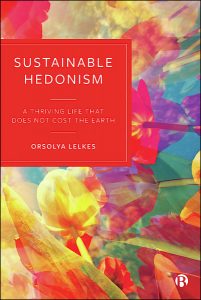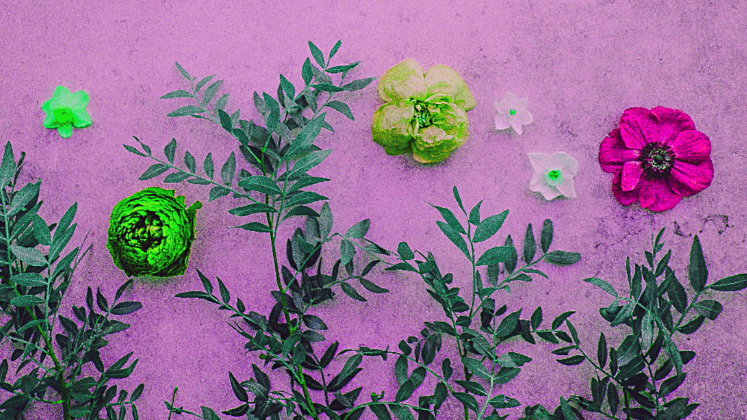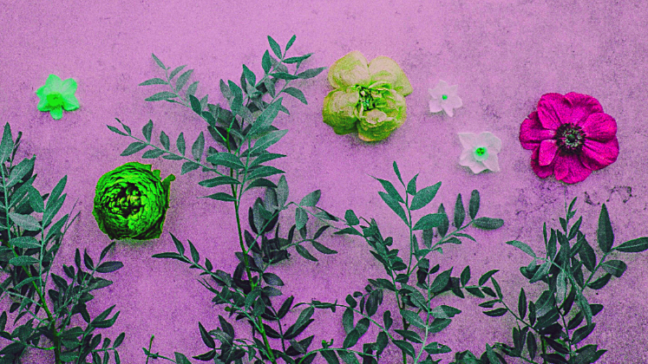This post was originally published on the LSE Review of Books on 9th November 2022.
Estimated reading time: 10 minutes
Orsolya Lelkes introduces her book, Sustainable Hedonism: A Thriving Life That Does Not Cost the Earth, which explores a vision of the good life that is both enjoyable and at the same time does not harm others and the planet.
Sustainable Hedonism: A Thriving Life That Does Not Cost the Earth. Orsolya Lelkes. Bristol University Press. 2021.

Sustainable Hedonism: A Thriving Life That Does Not Cost the Earth was my freedom project. As a researcher and policy analyst, working in the Ministry of Finance in Hungary and then in a UN-affiliated social research institute in Vienna, my spirited ambition to make a difference in social policies gradually drained. Not only did I not manage to make a significant contribution to fairer policies (just look at Hungary now), I did not really enjoy much of the research I was doing. I was following other people’s (policymakers and research funders’) agendas, rather than creating my own. I was mostly reacting, rather than acting. And to be honest, I was often bored re-reading my work.
What if I gave myself complete freedom in writing? What if I wrote about a topic I felt passionate about? A topic that was timely and relevant for others as well? What if I wrote something I enjoyed reading? But what is this something? I took a few steps back, gave space to myself and looked at things with a broader perspective. I listened to my inner voice, and listened to the voices of thought-provoking scientists, changemakers and rebels.
This freedom project was not easy. It took almost four years, including hot summers spent in a darkened room in front of a screen. I felt sometimes uncertain and stuck. A turning point was the supportive feedback from my former PhD supervisor, the late Sir Professor John Hills, who wrote to me on 1 Jan 2019 that the introduction made him want to read more and that ‘it sounds very exciting’.
I felt the urge to integrate the parts of my life that have been kept apart so far: that of being a social researcher and a coach and group facilitator. I realised that this divide exists not just in my own life but in science as well: there is often a wall between the collective and the personal dimension, say between economics and psychology. Mainstream neoclassical economics does not question personal tastes and preferences, how desires are formed and transformed. Rather, it takes preferences for granted. Psychology often ignores the collective dimension of personal suffering or thriving: for instance, how institutions and cultural norms affect the psyche. Why is this a problem?
Call for conscious hedonism
By now in the 21st century, we should live in perhaps the happiest of all possible worlds. Economics is all about utility (pleasure) maximisation. Psychology, positive psychology, offers us tools on how to live a happy life. Yet, despite all these tools and the immense economic progress we have made during the last centuries, we are very far from having created a happy planet. There is much suffering and injustice in the world, and nowadays the very foundation of our lives is being shaken by pandemics, wars, economic downturns and an ecological and climate crisis spiralling out of control. There is a growing anger and frustration in many. In parallel, there is denial and status quo bias in many others.
The title of my book, Sustainable Hedonism, is a puzzle, perhaps even a provocation. It is meant to make people stop, to step out of their daily routines and reflect. What is the story of success and the good life we are telling ourselves and our peers? This story is often taken from our families, communities, media, popular culture, perhaps in ways we are unaware: receipts on how to succeed, how to make the best out of life. And this story may not be for our own good, as testified by our personal failures like addictions of all sorts, loneliness, failing relationships, a lack of joy and sense of meaning as well as systemic failures like overconsumption, social exploitation and destruction. Yet, we often take these prescriptions of ‘the good life’ as if they were natural laws, like gravity, without realising our own potential for transforming them.

Image Credit: Photo by Annie Spratt on Unsplash
The key question of the book: Can we live a life that is both enjoyable and at the same time does not harm others and the planet? And can we speak of happiness at all in a world struck by COVID-19 and wars? Is it not a denial of reality? Is it not yet another toxic positivity?
I meant to create a realistic utopia, so to speak, where nothing is denied of the calamities of our times. Yet, the book has a positive, friendly, inviting tone, aiming to inspire the reader, rather than judge them from a standpoint of moral authority.
Minimalism in the age of maximisers?
We live in an age where hedonism is distorted and is often equated with unrestricted pleasure-seeking, material consumption and the immediate satisfaction of desires. People, friendships, goods, pastimes, natural beauty: these are just seen as objects of our desire, have no value in themselves and are judged according to whether they contribute to our own pleasure or not. Consumption is seen as a prerequisite for economic growth, but the nature of this consumption is rarely scrutinised. Neither are the detrimental aspects of the obsession with economic growth as a key indicator of progress. Neoclassical economics with its focus on utility-maximising has had a profound transformative effect on our culture.
The inconvenient truth is that most of us living in the Western world need to radically downsize our consumption if we want to be aligned to ecological limits and avoid global warming beyond 1.5 degrees. We need to converge to a one-planet lifestyle, a fair consumption space, that also respects the rights of those who are currently deprived. There are enough resources if we want to meet the basic needs of all, but not enough for meeting all the wants. Basic needs are finite, as argued by theorists of basic needs. Human wants, in contrast, are infinite, and are even artificially inflated by consumer culture. Thus, we cannot base our vision of a good life on unquestioned human wants.
It is evident that we need systemic solutions where public policies create the right institutions and incentives. For example, it is easier to give up using a car if there are safe bike lanes and good public transport. We can only opt for a clean energy supplier if one exists and is affordable. However, the necessary shift in public policies is unlikely without pressure from activists, voters, citizens. And most voters are unlikely to become ‘green’ if they see it as a personal loss.
The idea of reducing consumption is likely to meet much resistance, but only if high material consumption is seen as a prerequisite for high subjective wellbeing. There is empirical evidence that (a shift to) responsible consumption does not reduce subjective wellbeing, but rather can even boost it. But what is the pathway there?
Flourishing life – the philosophy of a good life for all
I argue that the Aristotelian philosophy of ‘eudaimonia’, translated as flourishing life or happiness, can be the normative foundation of a good life that does not harm others and the planet. Recent psychology provides powerful evidence on how to create such a life today.
According to Aristotle, happiness is not a passing feeling of euphoria based on the lucky constellation of external circumstances, but rather a soulful action. A key to this is the persistent practice of virtues, such as temperance, courage, good temper and generosity. Happiness is not individualistic, but is embedded in friendships and the community. Pleasure is based on self-mastery, fully enjoying what we have without being enslaved to our desires. In this approach of flourishing life, minimalism or conscious ways of enjoying life are not a loss, a painful self-denial, but rather a path to tranquility and lasting happiness.
As much as we have learnt our strategies for pleasure-seeking, we can unlearn them as well. We can become better hedonists and more virtuous at the same time. We can learn to take action that promotes both our own wellbeing, meeting our deepest psychological needs, while at the same time not harming others.
In my view, we cannot solve our problems on an intellectual level only. It is high time to move beyond the Cartesian tradition of exclusive focus on the mind and rational thinking. We need to ‘rediscover the world’ (using the phrase of Maurice Merleau-Ponty, the French phenomenologist philosopher), and engage the invisible forces in and around ourselves: the intelligence of our emotions, intuitions and our bodies.
I call for ‘laboratories of a flourishing life’ in universities and beyond, exploring the pathways for transformation. I show how experiential learning and psychodrama theatre can help us, and how we can explore the supportive as well as the saboteur forces in us enabling or hindering us living a flourishing life.
Sustainable Hedonism wants to inspire a mindset, an attitude, where one can take action to live a more enjoyable and more caring life. A life where we do not pay the price of burnout for feeling responsible. And we do not make others pay the price for our enjoyment and good life. It is meant to be a book offering a realist utopia of a good life.
If you are interested in Sustainable Hedonism, you can listen to and watch author Orsolya Lelkes discussing ‘Conscious Hedonism and Basic Needs‘ at a CASE special event, recorded at LSE on 24 May 2022.
